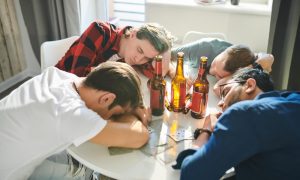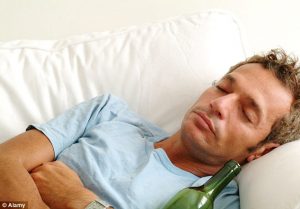
Why Alcohol Makes You Tired
Alcohol is known as a central nervous system depressant. In other words, it slows down brain activity. With that, you would feel sleepy and relaxed. Some people take advantage of this depressive effect to help them fall asleep faster — they take alcohol right before they go to sleep at night.
While this may help you fall asleep faster, there are other effects as well. Read on to find out why alcohol makes you feel really tired.
What does alcohol do to your body?
As a central nervous system depressant, alcohol slows down processes in your brain. Mainly, this is achieved through enhancing the effects of gamma aminobutyric acid (GABA), which is a brain chemical that inhibits transmission of electrical impulses in the nerves.
When you are under the influence of alcohol, you can experience the following effects:
 Slurred speech
Slurred speech- Uncoordinated movements
- Slowed reaction time
- Disturbed perceptions
- Distorted judgment
- Inability to think rationally
Combinations of these effects contribute to making you feel tired.
Alcohol also has stimulating effects. In fact, many people drink alcohol to experience effects like reduced social inhibitions and improved confidence. But drinking too much will bring out the sedating effects of alcohol. For that reason, habitual heavy drinkers often feel tired afterwards.
How does alcohol affect sleep?
 You may think that taking a shot before sleeping will help you rest better at night. And it’s true — alcohol does make you drowsy and helps you fall asleep more quickly. It does help, especially if you have trouble falling asleep.
You may think that taking a shot before sleeping will help you rest better at night. And it’s true — alcohol does make you drowsy and helps you fall asleep more quickly. It does help, especially if you have trouble falling asleep.
But that’s not all. Alcohol has another side effect that kicks in several hours after you have taken the shot. The alcohol inside your body will increase the levels of epinephrine, which is a stress hormone. Raised epinephrine levels result in faster heart rate and stimulation of the body, causing you to wake up several times in the middle of the night. Consequently, you may develop insomnia. In fact, data shows that about ten percent of cases of persistent insomnia are driven by alcohol.
Also, alcohol is a diuretic, so it makes you pee more. If you get the urge to pee in the middle of the night, you will have to wake up and go to the bathroom. This is another of the ways that drinking alcohol can disturb your sleep.
One more thing. It is not advisable to drink alcohol if you did not sleep well the previous night. If you do, you will feel more drowsy, especially if you drink at a time when your energy levels are low, like mid-afternoon or late in the evening.
Even if you did have a good sleep the night before, drinking alcohol during the day can still make you feel drowsy.
In addition, relying on alcohol to help you fall asleep can build tolerance. That means you will have to drink more alcohol to get the same effect. Over time, that will lead to alcohol use disorder.
What stages of sleep does alcohol affect?
 Normal sleep occurs in four stages. The first three stages of sleep are known as non-rapid eye movement (NREM) stages.
Normal sleep occurs in four stages. The first three stages of sleep are known as non-rapid eye movement (NREM) stages.
During the first stage, your body begins to shut down. Heartbeat, eye movements, breathing, and brain activity slow down, and your muscles relax. This stage is also known as light sleep.
During the second stage, your heart rate and breathing slow down further, and your eyes stay still. Your body temperature also drops slightly. Stage two often lasts the longest among the rest.
In the third stage, your breathing, heart rate, and brain activity reach their lowest levels. Your muscles become completely relaxed, and your eyes no longer move. This stage is also known as slow-wave sleep.
REM (rapid eye movement) sleep is the fourth stage. This occurs about 90 minutes after you have fallen asleep. During this stage, your eyes will move again, and your heartbeat and breathing will go faster. REM sleep is when dreams occur, too.
These stages repeat in cycles of 90 to 120 minutes each. If you sleep for eight hours, you get four to five of these cycles per night.
In the first cycle or two, slow-wave sleep takes the most time, and REM sleep lasts only for a maximum of ten minutes. In subsequent cycles, though, REM sleep dominates, lasting for a continuous 40 minutes or longer. NREM sleep usually stops during these cycles.
When you drink alcohol before sleeping, you will fall into a deep sleep more quickly. Later in the night, this will result in less REM sleep and more slow-wave sleep. As a consequence, your sleep quality will not be that good. You will experience more disturbances in your sleep, like waking up randomly in the middle of the night. In effect, you will not feel well-rested the next day.
Despite these effects, you can still drink alcohol moderately to help you sleep. To avoid feeling tired, it’s best to drink four hours before sleeping. That way, the body has enough time to process the alcohol you drank, and it won’t negatively affect your sleep quality.
Does alcohol cause insomnia?
Drinking before bed may lead to insomnia symptoms. Because alcohol disrupts sleep, you can experience symptoms like difficulty falling back asleep when you wake up in the middle of the night. Also, you may not be getting enough sleep as a result. During the day, this will lead to excessive drowsiness and feeling restless.
If drinking to fall asleep has become a habit, you may soon become dependent on alcohol. Then, during the day, you may resort to drinking coffee to stay awake. While drinking coffee is not bad in normal circumstances, you can become tolerant to it as well, especially when you always feel restless during the day.
This may turn into a vicious cycle of alcohol at night and coffee during the day, then offsetting the stimulating effects of caffeine with alcohol again so you can fall asleep.
And since coffee can mask the depressant effects of alcohol, you may have to drink more alcohol than usual to fall asleep. That can lead to dependence, and later on, alcohol use disorder.